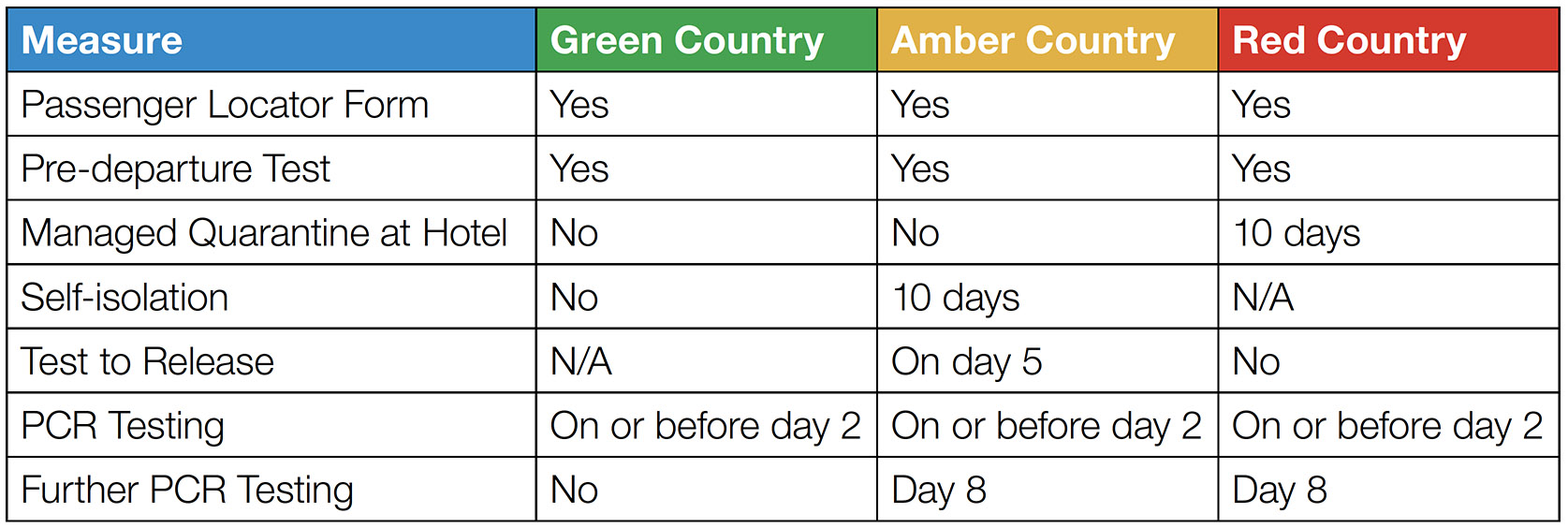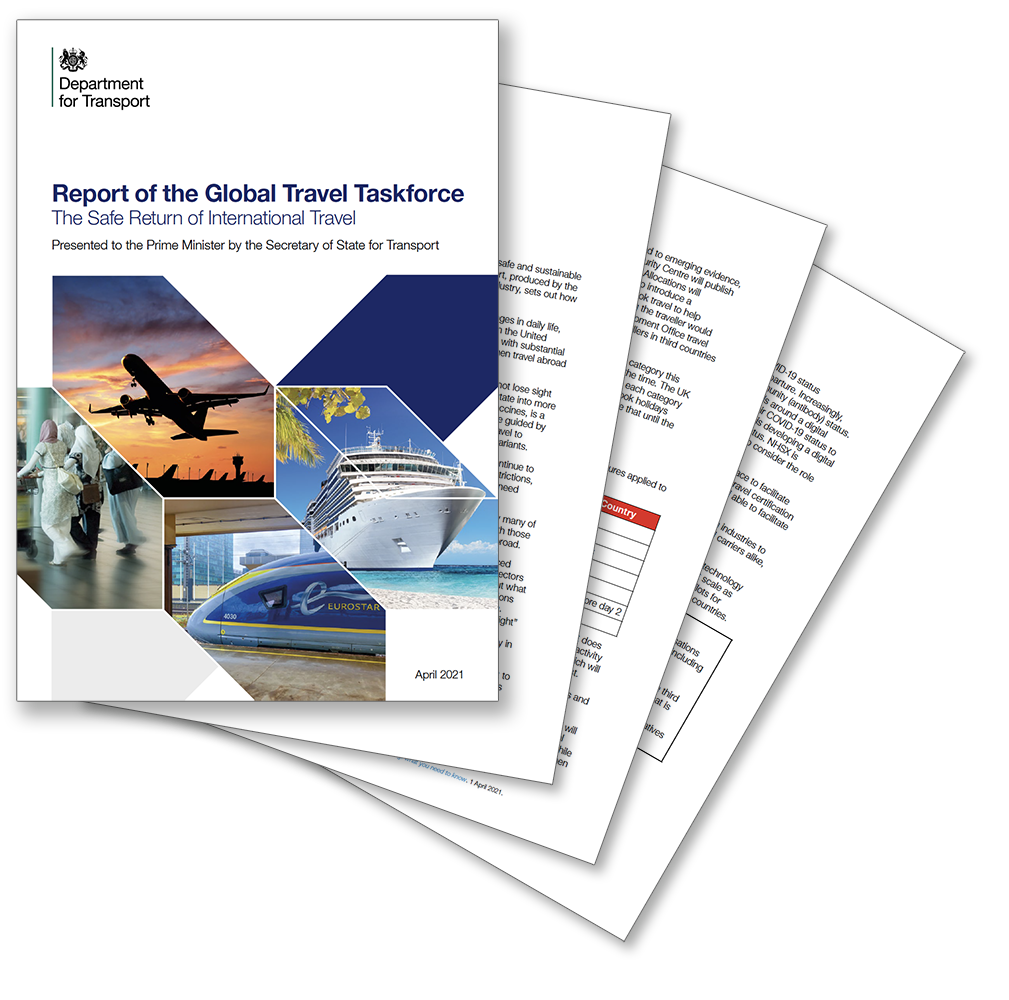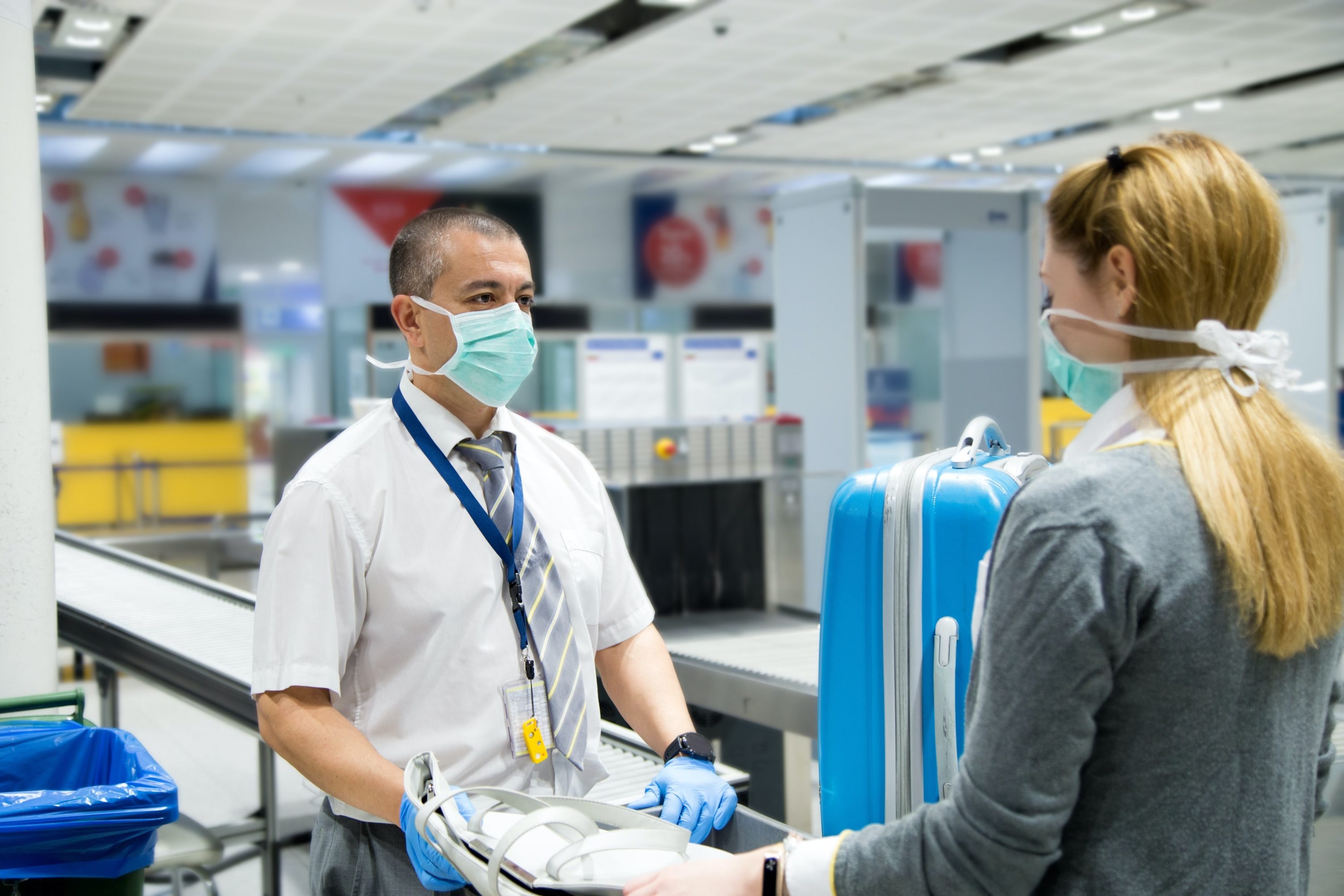Global Travel Taskforce Report
everything you need to know from the Transport Secretary's recommendations for the safe return of international travelPublished on 9 April 2021, the government’s Global Travel Taskforce report sets out the recommendations for a safe return to international travel. Here, we present a detailed overview of the Transport Secretary’s report – all the salient findings and key proposals you need to know and what they mean for business travel.
In February 2021, the Prime Minister asked the Secretary of State for Transport to convene a successor to the Global Travel Taskforce, building on the recommendations set out in November 2020 to develop a framework for a safe and sustainable return to international travel when the time is right.
The Taskforce sought the views of industry stakeholders across the travel and tourism sectors.
The report is an important landmark, detailing a series of recommendations to restore international travel safely following the coronavirus (COVID-19) pandemic.
General comments from Grant Shapps, Secretary of State for Transport

- This deadly virus, with its potential to mutate into more infectious and virulent variants which may threaten the efficacy of our current vaccines, is a – moving – constant threat.
- A safe, sustainable and robust reopening from 17 May at the earliest does not mark a “return to normal” for international travel.
- Our policy on non-essential international travel must therefore be guided by one overwhelming priority – public health.
- We cannot allow mass international travel to become a major vector for the introduction into the UK of dangerous COVID-19 variants.
- Even as we seek to re-open international travel, we cannot rule out future restrictions, should they prove necessary. Be in no doubt: this government will act swiftly if the need arises.
- Travel operators need some warning if country risk assessments – based on the “traffic light” system – are likely to change. The system being introduced today seeks to provide this warning – but it is subject to the strict condition that if this government needs to act swiftly in response to a sudden change in circumstances it will not hesitate to do so.
- We will confirm in advance if non-essential international travel can resume on 17 May. The measures introduced will be reviewed regularly and modifications made if and when necessary.
- 2020 saw the largest year-on-year decline in global air passenger traffic in aviation history and a 76% decline in inbound tourism.
The Traffic Light System
- Remove measures limiting outbound travel by 17 May at the earliest and implement a “traffic light” country system, to which different restrictions are applied depending on risk:
- Red countries: High-risk countries (currently known as “red list”).
- Amber countries: Moderate-risk countries.
- Green countries: Low-risk countries.
- Health measures for arrivals – this system will be in place from 17 May at the earliest. Associated measures applied to each category will be as follows:

- Introduce a “Green Watchlist” to support outbound travellers identify countries most at risk of moving from green to amber.
Forms & Apps
- Monitoring and compliance activity will remain, such as the consistent requirement of a Passenger Locator Form (which will be improved by 17 May).
- We will develop automatic validation of the Passenger Locator Form so that it cannot be submitted unless passenger can show that they have fulfilled requirements. This will reduce time spent processing non-compliant passengers at the border, although passengers should still expect extended waiting times whilst COVID-19 travel requirements are in place.
- Improved the Passenger Locator Form, with full e-gates integration across the largest airports by summer 2021 and all e-gate ports of entry by autumn 2021. We will develop automatic validation of the Passenger Locator Form so that it cannot be submitted unless passenger can show that they have fulfilled requirements. Form will also be provided in multiple languages.
- Maintain leadership role within multilateral organisations including the ICAO, IMO and OECD, and work with like-minded states including the G7, G20 and Five Eyes group to develop strategies for reopening international travel.
- Continue close coordination with industry to ensure third party apps can be integrated with a national digital certification system that is interoperable, safe and secure. The UK government will aim to support residents of England who wish to travel by providing verification that meets international requirements.
- The NHS is developing a digital and non-digital solution for individuals to demonstrate COVID-19 status. NHSX is working with the Department for Transport and other departments to consider the role of these in helping to facilitate outbound travel.
- For inbound international travel, our ambition is to have a system in place to facilitate travel certification for international travel. Any solution for international travel certification needs to be user friendly, interoperable with various other systems and able to facilitate a quick interaction at the border
- We will also explore the feasibility of bilateral pilots for testing initiatives such as digital solutions on particular routes, or with other countries.
Testing
- NHS tests at no cost for those with symptoms will not be permitted for use in international travel. Travellers must source tests from the approved list of providers and at the appropriate times as outlined in the table above. But This could include cheaper tests being used when holidaymakers return home, as well as whether the government would be able to provide pre-departure tests.
- Carrier checks also continue to be in place to bolster assurance on passenger compliance. Border Force will roll out e-gates integration across the largest airports by summer 2021 and all e-gate ports of entry by autumn 2021. We will continue to review capacity of the Managed Quarantine Service, NHS Test and Trace, and private testing.
Review
- Hold three “checkpoints” on 28 June, 31 July and 1 October.
- These reviews will also take account of a range of different evidence. This will include considerations of the four tests as set out in the roadmap:
- The vaccine deployment programme continues successfully.
- Evidence shows vaccines are sufficiently effective in reducing hospitalisations and deaths in those vaccinated.
- Infection rates do not risk a surge in hospitalisations which would put unsustainable pressure on the NHS.
- Our assessment of the risks is not fundamentally changed by new Variants of Concern.
- Use feedback from industry and CAA expertise to make targeted interventions to ensure operational safety.
- Establish a joint UK government and industry working group to ensure border readiness.
- Introduce a passenger COVID-19 charter by 17 May setting out consumer rights and responsibilities whilst measures remain.
Consumer Rights
- Government will also review the need to modernise the powers of other transport mode regulators so that all passenger rights, domestic and international, are protected. This will build on the Competition and Markets Authority investigations on the practices of travel agents and airlines in issuing refunds to customers affected by the travel restrictions during COVID-19. Latest data suggests that airlines are now paying the vast majority of refunds in a timely manner, within 14 days.
- Government has extended its backing for the whole of the Air Travel Trust Fund (ATTF) until 30 September 2022 so that ATOL bookings continue to be fully protected. If a travel business with an ATOL ceases trading, the ATOL scheme will continue to protect consumers who had booked ATOL-protected holidays with that business.
To help you navigate the changes of business travel, we’ve created the brand-new Traveller Toolkit. This invaluable online resource is packed full of easy-to-use guides and checklists for every stage of every journey. We detail exactly what you need to know and do before, during and after your trip.
You’ll also find innovative and interactive virtual trips, which walk you through each step of being at the airport, on the train and in the hotel. You can even check the travel restrictions and health status of your destination with our comprehensive COVID-19 Country Tracker, updated five times daily to ensure you have the very latest information to help keep you and your travellers safe.
Travel is changing. But with common sense and a good TMC behind you, travellers should have the confidence to once again take to the skies. It’ll soon be business as (un)usual.


